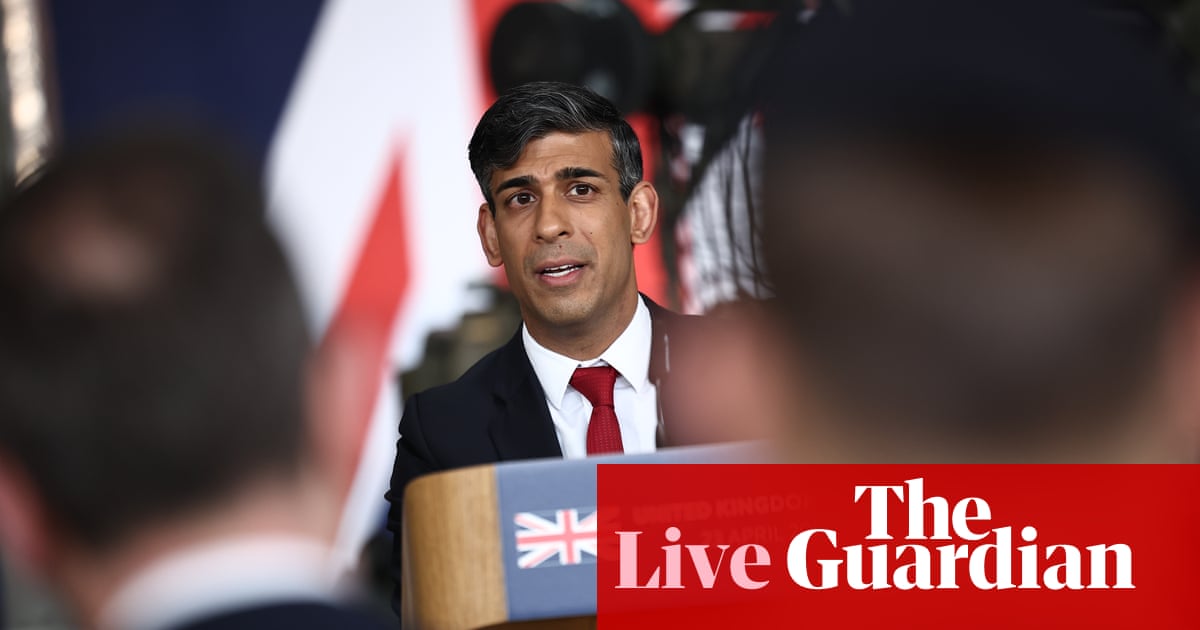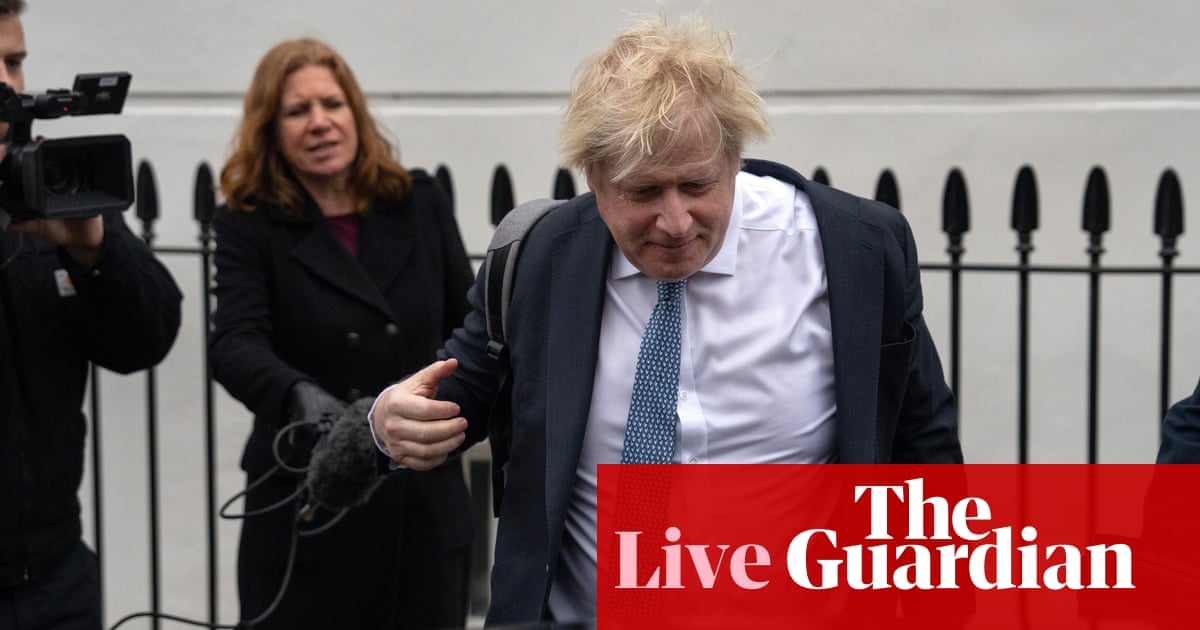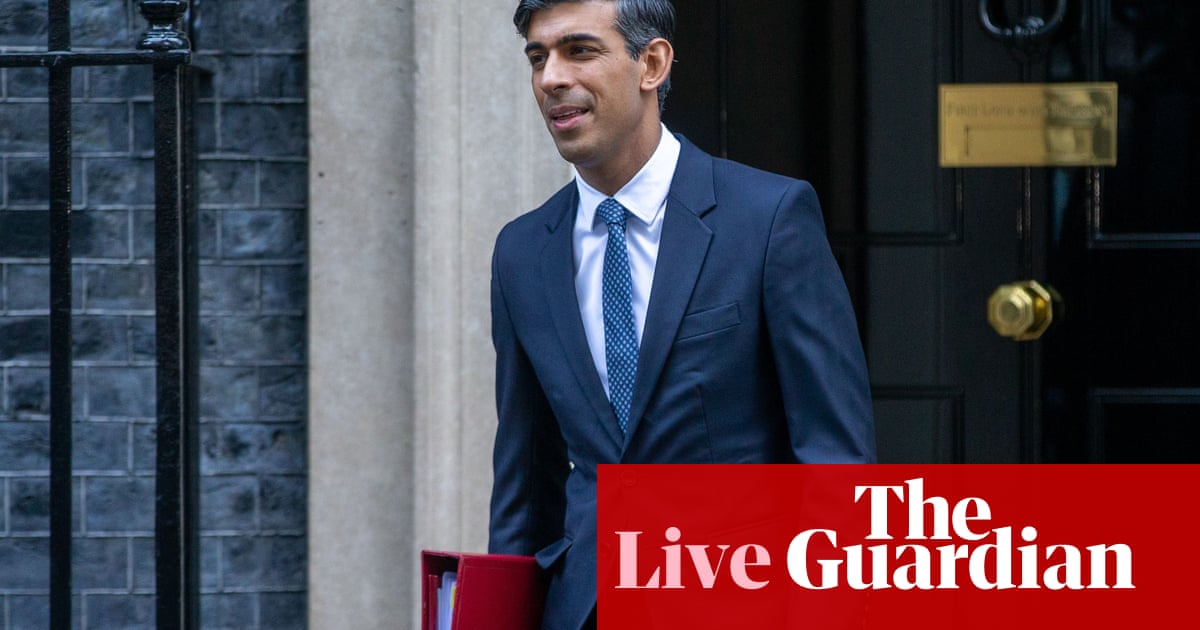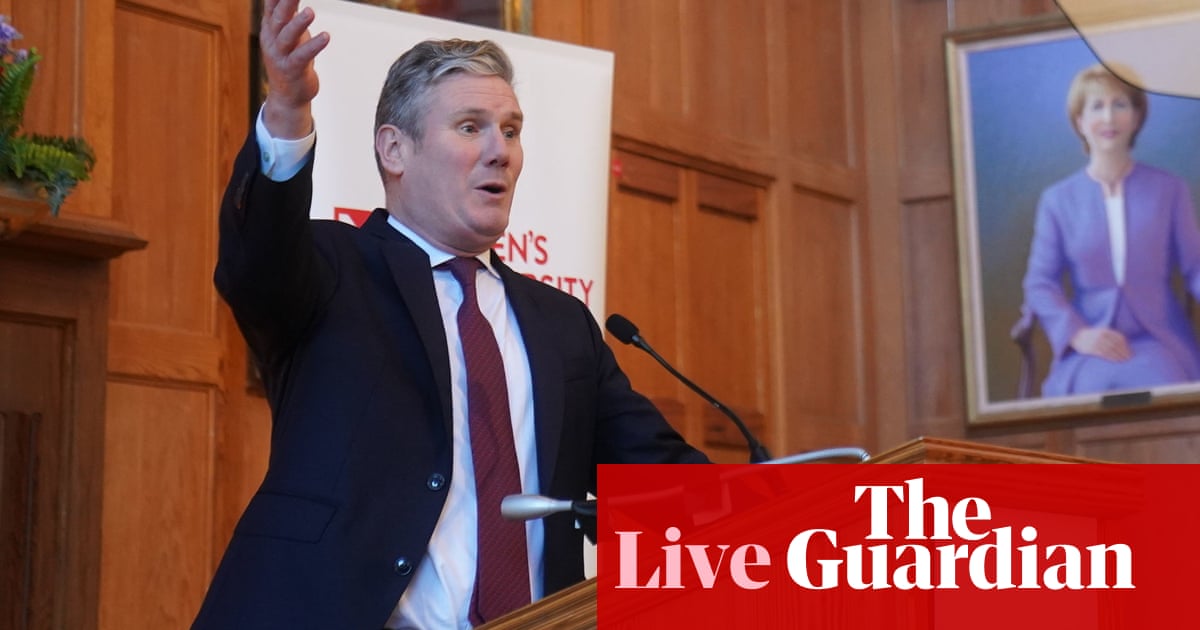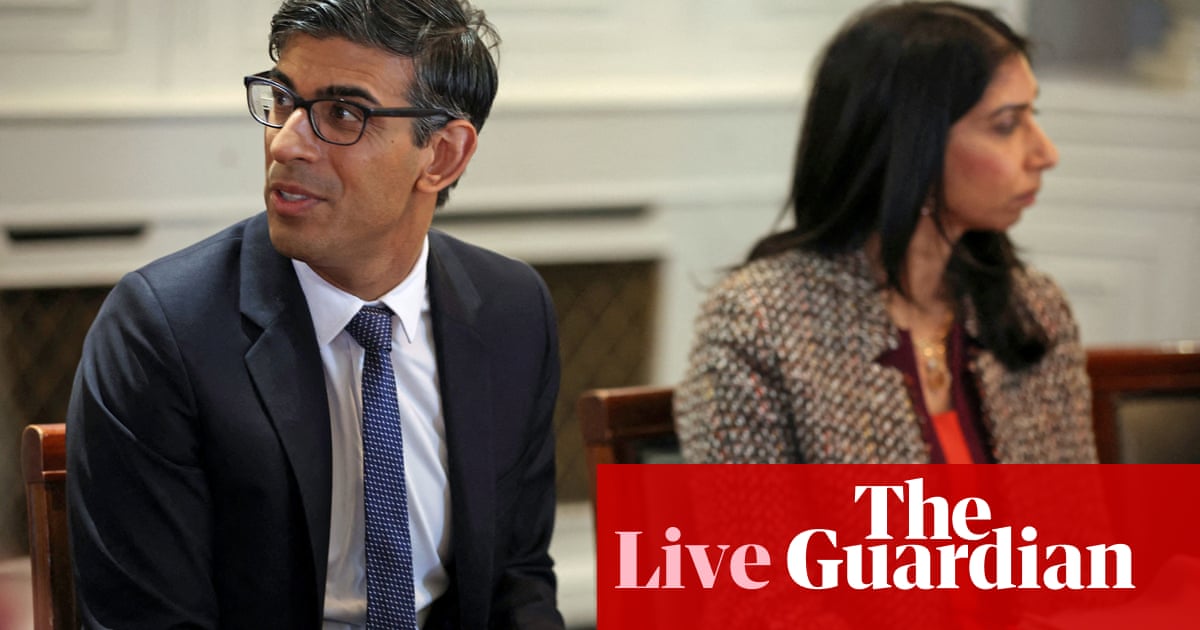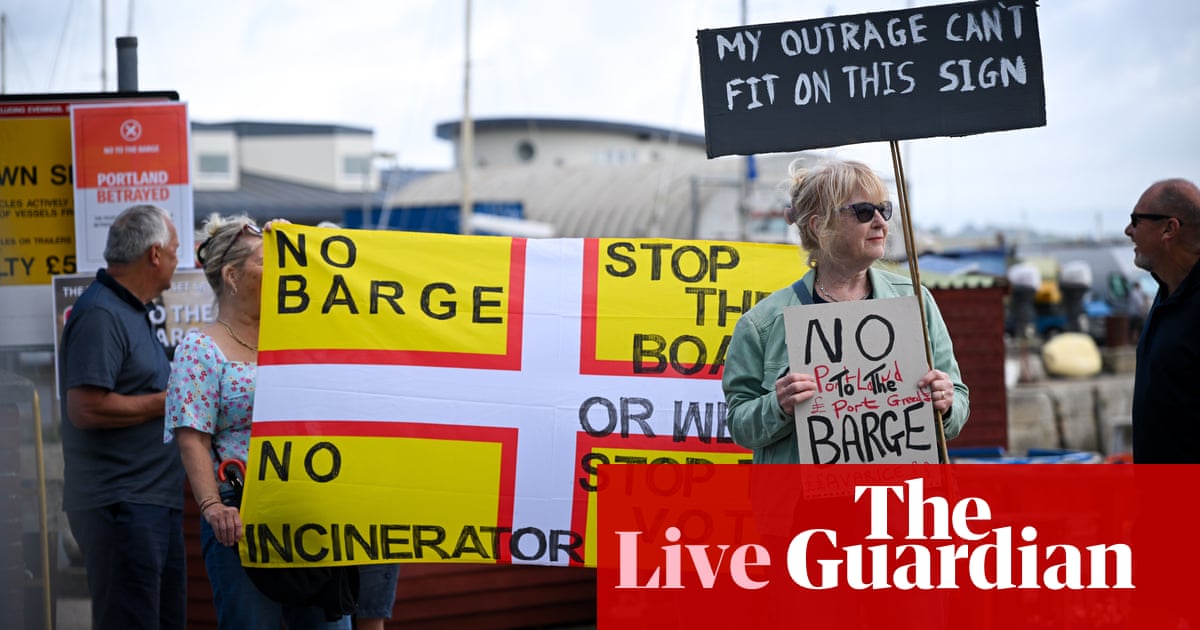
Sunak claims defence spending plan won"t affect government"s ability to keep cutting taxes
At the press conference the opening statements are over, and Rishi Sunak and Olaf Scholz are now taking questions.
Q: [To Sunak] Are you really being honest with people about the funding of your defence spending plan?
Sunak does not accept he is misleading people.
He says the government will reduce the size of the civil service.
The government is making a choice, he says.
He thinks it is important for Britain to stand up for its values.
He says this announcement is consistent with the government’s ability to “keep cutting taxes”.
He mentions tax cuts already announced, but he seems to be hinting that the defence spending announcement does not mean that further tax cuts won’t be included in the Tory election manifesto.
UPDATE: Sunak said:
The plan that I announced yesterday, it’s fully funded.
It’s funded, rightly with a reduction in civil service headcount back to 2019 levels. Snce then we’ve seen a very significant rise that isn’t sustainable or needed. The chancellor has conducted a detailed exercise, he announced this at the end of last year, that exercise is completed, and that’s what gives us the confidence that we can release the savings needed to fund our defence plan, combined with an uplift in R&S spending, which we have already budgeted for …
It is the biggest strengthening of our national defence in a generation. It is fully funded. And it is based on the fact that we have a strong economy and an economic plan that is working …
And it’s because our economic plan is working that I’m able to make these announcements and they are entirely consistent with our ability to keep cutting people’s taxes.
Afternoon summary
Rishi Sunak has claimed that his plan to increase defence spending to 2.5% of GDP by 2030 won’t stop the government from cutting taxes and investing in public services. (See 1.38pm.)
Angela Rayner has accused ministers of “obsessing” over her living arrangements and urged them to focus on implementing long-promised housing reforms instead.
Tributes from across the political spectrum have been paid to the former Labour minister and welfare campaigner Frank Field, who has died at the age of 81. And here is the Guardian’s obituary of Field, by Dennis Kavanagh.
Ministers have pledged to publish a long-buried internal study into the emotional and financial impact of fines and prosecutions incurred by tens of thousands of unpaid carers for falling foul of strict carer’s allowance earnings rules.
Jeffrey Donaldson has appeared in court charged with rape, gross indecency and other sexual offences spanning 21 years in a case that has stunned Northern Ireland.
Ministers are unable to say when the ban on no-fault eviction set out in the renters (reform) bill will actually come into force (see 3.16pm) because the government has tabled an amendment (new clause 30, or NC30) saying the Ministry of Justice must carry out a review of county court capacity first. This is one of the changes being made as a concession to landlords. The justification for it is that, if landlords cannot use no-fault evictions, they may end up spending a lot more time in court trying to persuade judges to allow them to remove their tenants.
This is one of more than 200 government amendments down for debate today. Most of them are very minor and technical, but they are needed because the government is making substantial changes to the bill too (like NC30). The bill has already gone through its committee stage in the Commons and it is unusual for so much re-writing to be taking place at this point.
In the debate this afternoon, defending NC30, Jacob Young, the housing minister, said:
If we don’t have a ready court system when we make this change, the biggest change in 30 years, if the courts aren’t ready for these changes that will not benefit tenants, it won’t benefit landlords, but it certainly won’t benefit tenants either …
New clause 30 will enable the government to assess the effects that our new tenancy system is having on the county courts before our reforms are rolled out more widely, giving us confidence that the sector is ready.
Tory MP Natalie Elphicke says renters (reform) bill has been made too favourable to landlords
The Conservative MP Natalie Elphicke has accused her own party of breaking a promise it made in its last election manifesto to ban no-fault evictions.
During this afternoon’s debate on the renters (reform) bill Elphicke echoed an argument made by Angela Rayner at PMQs (see 3.16pm), telling MPs:
This is a bill that the Conservative manifesto in 2019 promised would benefit tenants. Instead, this has become a bill where the balance too often is in favour of the landlords, particularly with the new clause 30 which could indefinitely delay the abolition of section 21 no-fault evictions.
If that were so, that would be nothing short of a betrayal for the Conservative manifesto that was promised in 2019 and, for that reason, I’m unable to support this today.
Referring to other features of the bill, which is being watered down by government amendments favourable to landlords, she said:
It is my view that this bill does not go far enough now in dealing with the fundamental challenges of the private rented sector. The private rented sector is no longer a flex or transitionary tenure. It is the main tenure for millions of people for much, if not all, of their lives.
Sadly, the original principle of the bill, which was to create a fair and responsible new rented sector, has been undermined by the government’s amendments.
Here are some of the pictures from today’s PMQs taken by Jessica Taylor, the official Commons photographer.
Don’t rescue people who scupper their Channel boats, says Reform UK deputy leader
Ben Habib, a deputy leader of Reform UK, has proposed not rescuing people in the Channel if they scupper their small boats and refuse new dinghies as they should “suffer the consequences of their actions”. Rowena Mason has the story.
A reader asks:
Is there any truth is the rumour that this “additional” defence spending will include the money spent/given to Ukraine and others abroad?
Yes, it will. I covered this on the blog yesterday, but here is the page from a Ministry of Defence document sent to journalists confirming that military aid to Ukraine is included in the sum linked to the 2.5% target.
According to polling by YouGov, while public concern about how the government was handling inflation went up at roughly the same rate as inflation itself, it is not going down at the same rate.
What Mhairi Black and Oliver Dowden said at PMQs about mass graves in Gaza
A reader has asked for a fuller version of the exchange at PMQs between Mhairi Black, the SNP’s deputy leader at Westminster, and Oliver Dowden, the deputy PM, about mass graves in Gaza. (See 12.23pm.)
Black started:
Two years ago, when mass graves were discovered in Ukraine, this House united in condemnation and rightly treated those graves as evidence of war crimes, which Russia must be made to answer for. Yesterday, Palestinian officials uncovered two mass graves outside the bombed hospitals in Gaza. Those graves also constitute a war crime, do they not?
Dowden replied:
Of course, we would expect the democratic Government of Israel to investigate any allegations of misconduct. That is exactly what they are doing, and it is exactly what the foreign secretary and the prime minister urge them to do. However, I find it quite extraordinary that the hon. Lady seeks to draw parallels between the legitimate war of self-defence of Israel and the conduct of Russia.
Then Black responded:
Three hundred bodies, including of the elderly and the injured, some of which had been stripped naked and mutilated, with their hands tied behind their backs. The UK’s own arms policy states that if there is even a risk that war crimes may be taking place, that is reason enough to halt the sale of arms. Given all that we know, why is the prime minister yet to do so?
And Dowden replied:
We continue to urge the Israeli government to investigate any allegations of misconduct. The difference though is that we can trust the Israeli Government – a democratically elected Government – to properly investigate those things. Of course, we keep the advice under review. The foreign secretary has recently made it clear that he has conducted a determination and has not changed his advice regarding export licences, and I think that is the correct decision.
Dowden accused of being "disingenuous" after suggesting at PMQs that no-fault evictions will end today
MPs are now debating the final stages of the renters (reform) bill. It is supposed to implement a commitment in the Conservative party’s 2019 manifesto to abolish no-fault evictions but amendments tabled by the government have watered this down.
At PMQs Angela Rayner, the deputy Labour leader, challenged Oliver Dowden, the deputy PM, to say when the ban on no-fault evictions would come into force. In an interview with the BBC this morning Michael Gove, the levelling up secretary, said he hoped the bill would become law before the election, and at PMQs Rayner asked Dowden:
This week the housing minister said there is no solid date for banning no-fault evictions, the housing secretary [Gove] now says it won’t happen before an election, so if he can give us a date, can he name it now?
Dowden replied:
I can name the date for [Rayner], today. It’s today that this house will be voting on it. And I’m confident that in line with our manifesto we will deliver on that commitment.
In response, the Renters’ Reform Coalition said Dowden was being “disingenuous”. Tom Darling, campaign manager at the coalition, said:
Michael Gove U-turned this morning to say he couldn’t guarantee the end of no-fault evictions. The deputy prime minister Oliver Dowden knows that no-fault evictions won’t be abolished today, so it’s disingenuous for him to say the practice will end today.
Renters facing these evictions up and down the country tomorrow, who have already been so badly let down by endless delays caused by Conservative landlord MPs, don’t deserve to have their hopes artificially raised yet again.
No 10 gives further details how it says civil service job cuts could save £2.9bn
Downing Street has now come up with an explanation for the discrepancy between the £1bn the government said it would save from civil service job cuts last autumn and the £2.9bn it now says those cuts will save. (See 2.15pm.)
No 10 says the £1bn figure was the amount that would be saved from capping headcount numbers at current levels. By March 2025 that would save £1bn, the Treasury said at the time.
But the figure quoted yesterday relates to how much would be saved by starting to reduce the civil service headcount from 2025-26 onwards. Those savings would get you to £2.9bn by 2028-28, No 10 says.
At the post-PMQs lobby briefing Downing Street was unable to explain why the government now expects to save far more from its plans to cut the size of the civil service than the amount it said it would raise when this proposal was first announced.
Explaining how it will fund the plan to increase defence spending to 2.5% of GDP by 2030, the government has said £1.6bn will come from an increase in R&D funding for defence and the remaining £2.9bn will come from a reduction in civil service headcount to pre-pandemic level – a reduction of 70,000 people.
But in October 2023, when Jeremy Hunt, the chancellor, announced the plan to reduce civil service numbers at the Conservative party conferenve, he said this would save £1bn by 2025.
A No 10 spokesperson said there were no further details about how those reductions would lead to a saving of almost £2bn more. She said:
There has been work under way with the Treasury and departments after announcing that we would cap headcount and we have now come forward with the costings associated with that and confirmed that would be reallocated to defence spending.
We will set it out in spending reviews in the usual way, there will be a programme of work.
There is no spending review expected this year and one would not be expected to take place until after the election.
UPDATE: After the lobby briefing No 10 did come back to journalists with an explanation for the discrepancy between the £1bn figure and the £2.9bn figure. See 2.39pm.
Labour dismisses Tory claim they will raise defence spending by £75bn as "fake figure"
Labour has described the government’s claim that it has a plan to raise defence spending by £75bn by 2030 as based on a “fake figure”. The Institute for Fiscal Studies has described this figure as misleading. (See 10.35am.)
Speaking in the Commons, in response to a statement from Grant Shapps, the defence secretary, his Labour shadow John Healey said:
If this 2030 plan had been in a budget, it would have been independently checked, openly costed, and fully funded. So where is the additional money coming from? How much from which other R&D (research and development) budgets? How much from cutting how many civil servants in which departments?
They’ve tried this trick before, in the 2015 defence review ministers pledged to cut 30% of the MoD civil servants to make their defence spending plans add up. Civil servant numbers didn’t go down, they went up. Not down to 41,000 but up to 63,000.
Now he’s mentioned an additional £75bn five times in his statement, over the next six years the government’s official spending plan are based on a 0.5% real annual growth in chore defence spending. Why has he invented his own zero growth baseline to produce this fake figure claiming an extra £75bn for defence. The public will judge ministers by what they do, not what they say.
In response, Shapps said:
He says judge us by our action, not our words. You know what, we will, because 11 members of that side’s frontbench voted against Trident. So it’s no good for him and the leader of the opposition to go up to Barrow and claim that they’re all in favour now of the nuclear weapons, of the nuclear defence.
Some 402 people were detected crossing the Channel on Tuesday, according to provisional figures from the Home Office, PA Media reports. PA says:
The cumulative number of arrivals by small boats in 2024 now stands at a provisional total of 6,667.
This is 20% higher than the total at the equivalent point last year, which was 5,546, but slightly lower (down 0.4%) than the total at this stage in 2022, which was 6,691.
Some seven boats were detected on Tuesday, which suggests an average of around 57 people per boat.
There were 29,437 arrivals across the whole of 2023, down 36% on a record 45,774 arrivals in 2022.




